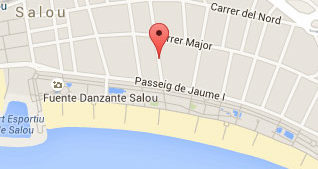How to avoid online scams when booking an apartment online?
Guide to avoid scams when booking an apartment: ghost reservations
Accommodations that do not exist where they say they are, systems that capture our personal data at the time of payment (phishing), false online travel agencies, false offers, accommodations without a license, etc. has caused users to increasingly have less confidence when making a reservation through a website, a collaborative economy platform or an online travel agency (OTA).
Tools to detect fake ads
Main characteristics of online platforms:
- They publish advertisements for accommodation of all types (hotels, apartments, campsites, independent rural accommodation, etc.)
- They have a reservation engine (24 hours) with immediate confirmation and show the availability of accommodation in real time through calendars synchronized with the rest of the platforms or through a Channel Manager integrated into a PMS (Property Management System) with which the property works.
- They issue a reservation number (essential when accrediting any claim)
- They have a Customer Service, which performs the tasks of mediator during any conflict between client and business.
- They have a Terms and Conditions of Use document for the platform that the user accepts, which specifies the booking conditions (hotel, flight, car rental, etc.)They have an online payment system that allows the user to use a payment gateway (Virtual POS) or make payments through other systems such as PayPal or Stripe without having to enter credit card information. In turn, the platform offers the owner the option to charge said amount through the data provided by the client (the owner enters the data of a credit card in his POS), issuing a B2B virtual card (the property enters in your POS the details of this card with a balance equal to the amount of the reservation on the check-in date) or receive the funds via bank transfer (usually transferred a few days after the client’s arrival).
These platforms allow owners and managers of tourist accommodation to publish their advertisements based on specific rules and a predetermined design. In short, it is a standardized publication that creates a profile of the property or accommodation. Periodically, platforms usually update their rules of use and add new functionalities to the system based on user suggestions, which allow us to improve aspects of usability and efficiency.
For me, the best system that currently exists, with better functionality, design and usability, is Booking.com. Secondly, Expedia (more specialized in vacation packages). In the following posts I would point out the Airbnb and Tripadvisor systems, which are usually very easy to use, although the design of the extranet is light years away from Booking.com.
If the client does not respond to the platform’s requests, the property can cancel the reservation without any penalty.
Every day these platforms receive new registrations of properties that do not exist or do not comply with their rules. Villas in luxury residential areas, apartments on the beach, lofts in large cities, luxury penthouses, etc.
These new registries aim to publish ads that look real by creating fake profiles. For this they usually use:
- Pictures of the same accommodation: to clone the ad
- Pictures of other establishments with similar names or tradenames.
- Pictures of properties that are not available as vacation rentals but are published on real estate agency pages.
- They entern a license number into the system that usually does not correspond to the property
- They copy descriptions from other ads or from the same one they intend to clon
Its objective:
- Obtain customer credit card information and thus be able to quickly make illegitimate use of their funds.
- Clone the credit card
- Sell card details on the dark web
What should make us suspect that the advertisement is false?
- Very cheap offer compared to other platforms
- Very expensive offer compared to other platforms
- Availability on only one of the platforms we have searched
- Discrepancy in location data (address, phone number from another country, etc.)
- Property pictures do not match on all platforms
- The pictures are not of the same size and quality (they are not in high definition)
- When we contact the property’s telephone number, no one answers us or when we ask certain questions by email we don’t receive an answer.
- When they call us from the property and ask us for personal information or our credit card, alleging technical problems.
- When we receive an email from the property requestion to make the payment again. We have to suspect whether we can prove that we have made the payment within the agreed period.
- When they require an advance payment from us via bank transfer to an account number where the property details do not match with the details of the credit accound holder.
Normally, when there is a problem or technical failure with the reservation, the property will never ask us for personal data, but rather it will be the property that will contact the platform and it will contact us by email or by phone depending on each case. It will be your own Customer Service department that will contact us to resolve the problem or ask us to re-enter credit card information into the system in order to complete our reservation or any other information that may affect the effectiveness of our reservation.
Sometimes we may receive a fraudulent email that asks us to enter our passwords to access our interface or user page and thus obtain all our data illegitimately. Other times, we will access a web page cloned from the original (phishing) to make it look real. Therefore, we must be careful and always enter the correct domain name. We should never click on a domain from a search engine listing without reviewing said domain or url. It is also not advisable to open a link sent via email without checking that the link corresponds to the url of the original site.
It is therefore advisable, if we have suspicions, to consult the public databases of each Autonomous Community on Tourist Accommodations, obtain its license number and check whether the data obtained coincides with that of the publication consulted (name, location, telephone number, website). , etc.). In this way we will be able to detect establishments that illegally advertise under the umbrella of a single license or are registered with a false license number that surely belongs to another establishment.
On other occasions, we can detect web pages that try to simulate the establishment’s own website or pretend to be Reservation Centers, when in reality their main objective is to position themselves in the lists of the main search engines and Meta Search (metasearch engines), above their own. establishment pages. Many of these instrumental web pages are owned by well-known OTAs that duplicate the contents of their own advertisements under domains (URL) of the type:
“establishment name.cityhotels.org/es”
(i.e. leixideta.salouhoteles.org/es).
In this way, they aim to capture reservations by redirecting traffic to their own website by opening a new window in our browser or by pretending to be an intermediary (partner) without leaving the same browsing window.
If the number of clicks on these domains is significant and greater than on the accommodation’s own website, it will cause search engines such as Google to organically place the official domains several positions below this instrumental domain on the first page or even on a second page. from the list.
Another type of scam that most customers are unaware of is overoccupancy.
Many of the establishments that do not comply with the regulations governing housing for tourist use and tourist accommodation establishments overoccupy with more places than allowed according to regional regulations. The entity responsible for inspections in this type of establishments is usually the City Councils, although it is well known that they have technical problems in pursuing this type of actions.
The maximum occupancy is determined by the habitability certificate of each property. With this practice, many accommodations compete unfairly by offering a price differential of up to 50% compared to establishments that do comply with said regulations.
We believe that accommodations have to meet certain habitability conditions as an essential requirement to offer a quality service. We consider that this type of practices (sofa bed in the dining room, folding beds in the hallways, bunk beds on both sides of the room, etc.) detract from the comfort of the room, generate serious problems of coexistence with neighbors and gentrification in the more central and tourist areas of the towns, degrading the urban space while it loses its identity, the basis of its current wealth.
We encourage you to report bad practices, abuses and scams (or their attempts) at the Citizen Service Offices, on the online platforms themselves or before any Official Organitzation.





Leave a Comment
You must be logged in to post a comment.